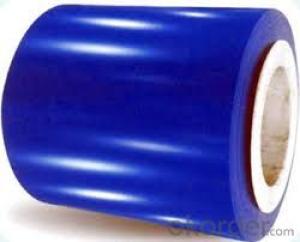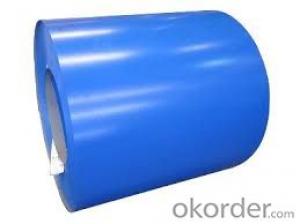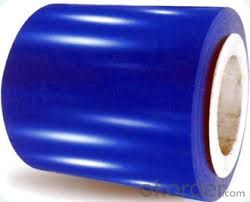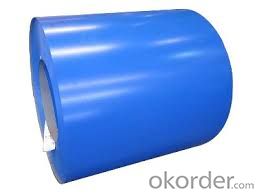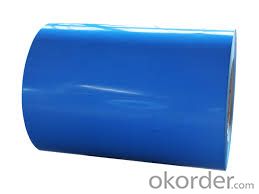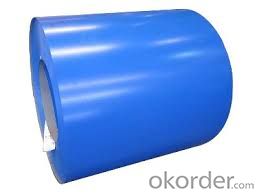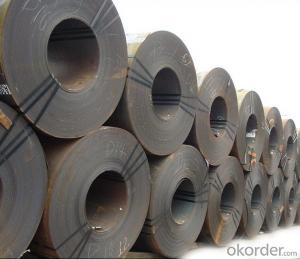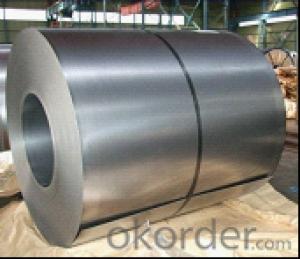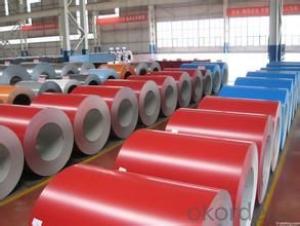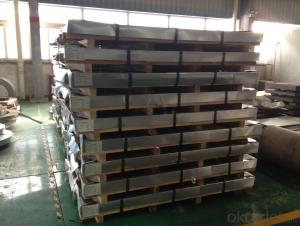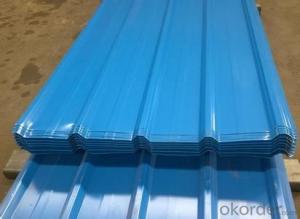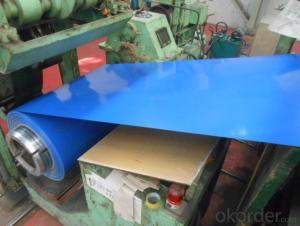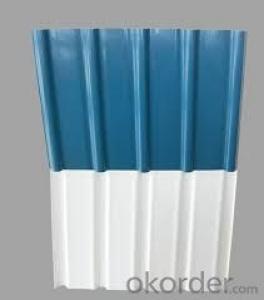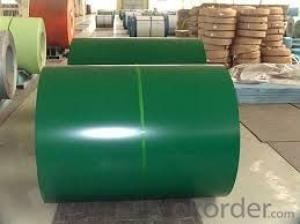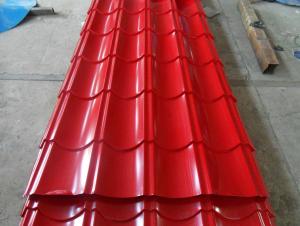Prepainted Galvanized Corrugated Steel Plate Sheet Usage:roofing sheet
- Loading Port:
- Tianjin
- Payment Terms:
- TT OR LC
- Min Order Qty:
- 100 m.t.
- Supply Capability:
- 500000 m.t./month
OKorder Service Pledge
OKorder Financial Service
You Might Also Like
Packaging & Delivery
| Packaging Detail: | Standard package for export |
| Delivery Detail: | 15 days after receipt the deposit or Original L/C |
Specifications
Prepainted roofing steel sheets
1. Thickness: 0.15mm---1.5mm
2. Width:800,900,1200,1220,1250mm
3.can be prepainted
Commodity | color coated galvanized steel plate |
Material | Galvanized steel sheet Galvalume steel sheet Pre-painted galvanized sheet |
Coating | PE,PVDF,galvanized(30-300g),galvalume (AZ80) |
Model No. | YX25-207-828 |
Sheet Thickness | 0.15---1.5mm |
Sheet Peak Height | 25mm |
Sheet Peak Spacing | 207mm |
Width | 800mm,900mm,1000mm |
Length | any length,according to the transportation,generally less than 12m |
Color | Standard color: red,blue,white grey Special color: according to RAL color |
Characteristic | 1 weatherproof 2 heating insulation 3 fireproof 4 anti-rust 5 sound insulation 6 long life span: more than 25 years
|
Packing | Plastic film,pallet or as your requests |
Delivery time | 15 days |
Payment | T/T,L/C |
- Q: What are the safety considerations when handling steel sheets?
- When handling steel sheets, there are several safety considerations to keep in mind. Firstly, it is important to wear appropriate personal protective equipment (PPE) such as gloves, safety glasses, and steel-toed boots to protect against potential injuries. Secondly, steel sheets can be heavy and cumbersome, so it is crucial to use proper lifting techniques and equipment to avoid strains or muscle injuries. Additionally, sharp edges or corners on steel sheets can pose a risk of cuts or punctures, so caution should be exercised when handling them. Lastly, steel sheets can be slippery when wet or oily, so it is essential to maintain a clean and dry working area to prevent slips and falls. Overall, awareness, caution, and adherence to safety protocols are key when handling steel sheets to ensure the well-being of individuals involved.
- Q: How do steel sheets compare to other materials, such as aluminum or copper?
- Steel sheets have several advantages over other materials such as aluminum or copper. Steel is generally stronger and more durable, making it suitable for applications that require high strength and resistance to wear and tear. It is also more cost-effective and readily available, making it a popular choice in various industries. While aluminum and copper may offer better conductivity or corrosion resistance, steel sheets often provide a good balance of properties, making them a versatile and widely used material.
- Q: What are the different sheet metal bending techniques for steel sheets?
- Steel sheets can be manipulated and shaped using various sheet metal bending techniques. These techniques help achieve desired forms and angles. Some commonly used techniques include: 1. V-bending: A V-shaped punch and die set are used to create a sharp bend in the steel sheet. The material is placed between the punch and die, and force is applied to form the desired angle. V-bending is versatile and can create different angles and shapes. 2. Air bending: In this technique, a punch presses the steel sheet into a V-shaped die without completely contacting the material. Bending is achieved by controlling the depth of penetration of the punch. Air bending allows for greater flexibility in angle adjustments and requires less force. 3. Edge bending: This technique involves bending the edge of the steel sheet to create flanges or edges with specific angles. The sheet is clamped between a punch and a die, and force is applied to bend the material along the edge. 4. Bottom bending: This technique is used to create larger bends in steel sheets. The sheet is clamped between a punch and a V-shaped die, and force is applied to bend the material around the die. Bottom bending is suitable for creating U-shaped parts or boxes. 5. Roll bending: Also known as cylindrical bending, this technique is used to create cylindrical or curved shapes in steel sheets. The sheet is passed through a set of rolls that gradually bend the material into the desired shape. Roll bending is commonly used in the production of pipes, tubes, and cylinders. 6. Coining: Coining is a precision bending technique that creates crisp, sharp bends. The steel sheet is pressed between a punch and a die, with the die featuring a sharp edge. High pressure is applied, resulting in a precise and defined bend. These are just a few of the many sheet metal bending techniques available for steel sheets. Each technique has its advantages and applications, and the choice of technique depends on factors such as the desired angle, sheet thickness, and shape complexity.
- Q: Are the steel sheets suitable for outdoor applications?
- Yes, steel sheets are suitable for outdoor applications. Steel is a durable and strong material that can withstand various weather conditions and environmental factors. It is resistant to rust and corrosion, making it ideal for outdoor use. Additionally, steel sheets can be treated or coated to enhance their resistance to moisture and other elements, further improving their suitability for outdoor applications. Whether it is for construction, manufacturing, or decorative purposes, steel sheets are a reliable choice for outdoor projects.
- Q: Are steel sheets suitable for manufacturing kitchen appliances?
- Kitchen appliances can be manufactured using steel sheets, which are well-suited for this purpose. Steel is a durable material with many uses in the manufacturing industry. It possesses high strength, making it capable of withstanding the everyday wear and tear experienced by kitchen appliances. Moreover, steel sheets are resistant to corrosion, a vital quality in a kitchen environment where appliances are frequently exposed to water, moisture, and food spills. In addition, steel is a hygienic material that is easy to clean and maintain, making it an ideal choice for kitchen appliances where cleanliness is of utmost importance. Furthermore, steel sheets can be easily shaped and formed into various designs and sizes, allowing for a wide range of kitchen appliances to be produced. Overall, steel sheets possess the necessary properties and characteristics needed for the production of kitchen appliances.
- Q: Can steel sheets be used for manufacturing machinery parts?
- Yes, steel sheets can be used for manufacturing machinery parts. Steel is a strong and durable material that is commonly used in the manufacturing industry for various applications, including machinery parts. Steel sheets can be easily formed, cut, and welded to create complex shapes and structures required for machinery components. Additionally, steel offers excellent mechanical properties such as high tensile strength and resistance to wear, which are crucial for machinery parts that are subjected to heavy loads and frequent use.
- Q: How do steel sheets perform in terms of abrasion resistance?
- Steel sheets generally offer excellent abrasion resistance due to their hardness and durability. They are often used in applications where resistance to wear and tear is crucial, such as in construction, manufacturing, and automotive industries.
- Q: Can steel sheets be used for soundproofing purposes?
- Yes, steel sheets can be used for soundproofing purposes. Steel is a dense and rigid material that effectively blocks the transmission of sound waves. When used in soundproofing applications, steel sheets can help reduce the amount of sound that passes through walls, floors, or ceilings. They can be installed as a barrier or added as an additional layer to existing structures to increase their soundproofing capabilities. However, it is important to note that steel sheets alone may not provide complete soundproofing, as sound can still travel through other pathways such as windows or doors. Therefore, a comprehensive soundproofing strategy may involve combining steel sheets with other sound-absorbing materials, such as acoustic foam or insulation, to achieve optimal results.
- Q: What are the different types of steel sheet coatings?
- There are several different types of steel sheet coatings, including galvanized coatings, tin coatings, and polymer coatings.
- Q: How are steel sheets cleaned and maintained?
- Steel sheets can be cleaned and maintained using various methods depending on the specific requirements and conditions. Here are some common practices to clean and maintain steel sheets: 1. Regular cleaning: Steel sheets should be cleaned regularly to remove dust, dirt, and other debris that may accumulate on the surface. This can be done using a soft cloth or sponge with mild soap or detergent and warm water. Avoid using abrasive cleaners or scrub brushes that can scratch the surface. 2. Rust removal: If rust spots appear on the steel sheets, they should be promptly removed to prevent further corrosion. Rust can be removed using a wire brush, sandpaper, or a rust remover solution. Afterward, the area should be thoroughly cleaned and dried. 3. Protective coating: Applying a protective coating can help prevent rust and corrosion, especially for steel sheets exposed to harsh environments or moisture. This can be done using paint, varnish, or a specialized anti-corrosion coating. The coating should be applied according to the manufacturer's instructions and reapplied periodically as needed. 4. Proper storage: Steel sheets should be stored in a dry and well-ventilated area to prevent moisture buildup and corrosion. They should be kept away from direct contact with the ground and other metals to avoid galvanic corrosion. Additionally, using covers or protective wraps can further safeguard the sheets from dust and other contaminants. 5. Periodic inspection: Regularly inspecting steel sheets for any signs of damage, such as dents, scratches, or cracks, is essential. If any damage is found, it should be repaired promptly to prevent further deterioration. 6. Professional maintenance: For large-scale or complex steel sheet installations, it may be necessary to hire professional maintenance services. These experts have the knowledge, tools, and experience to handle more extensive cleaning, maintenance, and repairs. By following these cleaning and maintenance practices, steel sheets can maintain their integrity, appearance, and performance over time.
Send your message to us
Prepainted Galvanized Corrugated Steel Plate Sheet Usage:roofing sheet
- Loading Port:
- Tianjin
- Payment Terms:
- TT OR LC
- Min Order Qty:
- 100 m.t.
- Supply Capability:
- 500000 m.t./month
OKorder Service Pledge
OKorder Financial Service
Similar products
Hot products
Hot Searches
Related keywords
